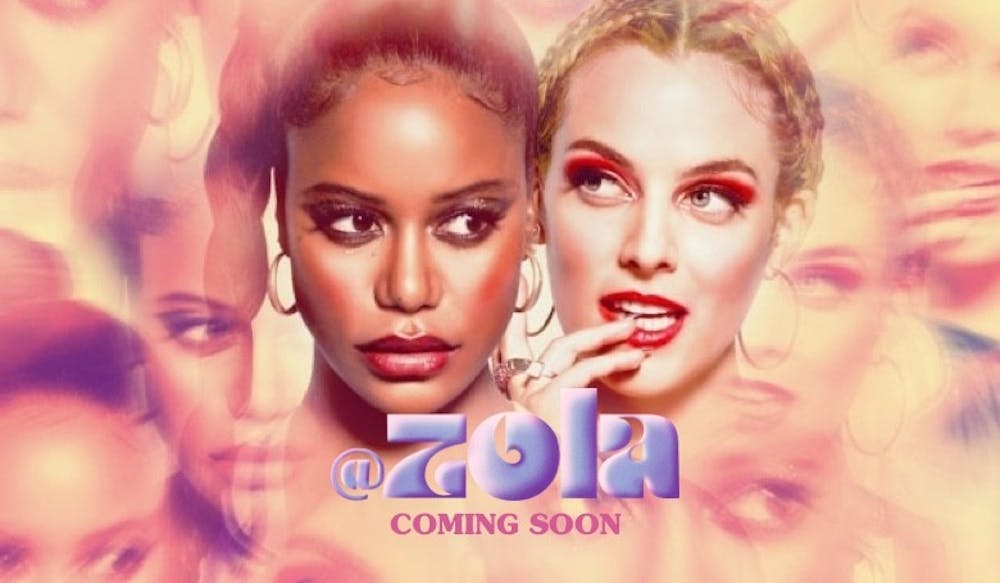The following article contains spoilers for ‘@Zola.’
A24’s proclivity for throwing money at just about any film that comes its way has yielded the most critically acclaimed filmography of the past decade. That approach is important for movies like @Zola, which probably wouldn’t have made it past the elevator pitch at any major production company. In theory, @Zola is riddled with red flags: It’s a) based on a series of tweets, b) barely breaks an hour and a half, and c) will draw easy comparisons to Harmony Korine’s discomfiting Spring Breakers. The film also centers Black women behind and in front of the camera, a rarity for the Hollywood silver screen. But barring a few caveats, @Zola succeeds on strong performances and direction that carry the film beyond its tweet–thread origins.
Janicza Bravo’s best directorial work centers on the female body’s aestheticization one moment and violation the next. It comes down to a question of autonomy. When Taylour Paige’s Zola pole dances, her muscles are graceful and her skin is practically luminescent. Contrast this with a gruesome montage in which sex worker Stefani has her schoolgirl outfit repeatedly removed by different clients. Bravo also derives clear inspiration from David Lynch, employing dreamlike transitions between scenes and plenty of extended highway shots.
@Zola isn’t just inspired by a series of tweets—the film’s presentation is so digitally mediated that it practically takes place inside of a phone. One sequence shows Stefani and Zola, along with Stefani’s boyfriend and “roommate” (later revealed to be her pimp) rapping along to “Hannah Montana” through someone’s selfie–cam. Near–constant iPhone pings mingle with Mica Levi’s characteristically stellar score, which combines twinkling ringtone motifs with ominous drones. The entire film is doused in Valencia, and all these details accentuate that this story is both on and of social media.
As for the film’s performances, Riley Keough’s Stefani appears to be unfazed by norms of political correctness, channeling Bhad Bhabie with a blaccent to match. Cousin Greg (Nicholas Braun) from HBO’s Succession also makes an appearance as, effectively, Cousin Greg. But Paige is given the most challenging role, since she has to straddle the divide between audience surrogate and over–the–top storyteller. When Zola delivers the film’s tagline (“y’all wanna hear a story about why me & this bitch here fell out????????”) it sounds blasé. You don’t hear those eight question marks from the original tweet.
It can be disappointing to see Zola rendered as a passive figure in her eponymous film, but keep in mind that the film’s name is stylized as “@Zola” rather than just “Zola.” The movie’s true main character is Zola’s online persona. It can feel like Paige is the physical embodiment of that detached perspective; the necessary calm eye at the center of the plot’s chaotic storm. At one point, there’s a visual gag which depicts what the events of @Zola would have looked like from Stefani’s hilariously delusional perspective. On the surface, this sequence gives us plenty of laughs and some instantly iconic trash bag couture. But Bravo also highlights that there is no objective account of this story; she embraces the degrees of separation between this film and the events it depicts.
However, the plot of @Zola is notably weakened in being beholden to the inspirational Twitter thread. Some critics have praised the resulting unconventional pacing, and I enjoyed how the narrative flow felt psychedelic or hallucinatory. However, it’s harder to excuse the lack of a satisfying ending. Instead, the story dissipates just as Zola’s circumstances reach a new peak of absurdity. A part of me was left unsatisfied by how Bravo and screenwriter Jeremy O. Harris didn’t break the mold of their source text, à la Charlie Kaufman in Adaptation. Whether denying viewers this catharsis was intentional or not, for a movie concerned in large part with the aesthetics of social media, it’s appropriate that @Zola is an aesthetic triumph first and foremost.







